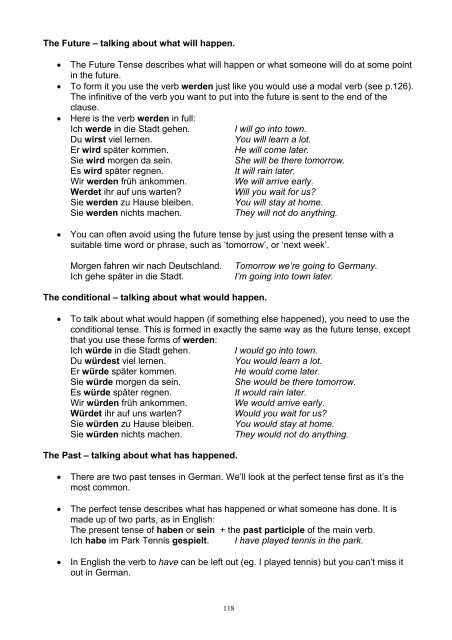VOCABULARY - AQA
VOCABULARY - AQA
VOCABULARY - AQA
Create successful ePaper yourself
Turn your PDF publications into a flip-book with our unique Google optimized e-Paper software.
The Future – talking about what will happen.<br />
• The Future Tense describes what will happen or what someone will do at some point<br />
in the future.<br />
• To form it you use the verb werden just like you would use a modal verb (see p.126).<br />
The infinitive of the verb you want to put into the future is sent to the end of the<br />
clause.<br />
• Here is the verb werden in full:<br />
Ich werde in die Stadt gehen. I will go into town.<br />
Du wirst viel lernen. You will learn a lot.<br />
Er wird später kommen. He will come later.<br />
Sie wird morgen da sein. She will be there tomorrow.<br />
Es wird später regnen. It will rain later.<br />
Wir werden früh ankommen. We will arrive early.<br />
Werdet ihr auf uns warten? Will you wait for us?<br />
Sie werden zu Hause bleiben. You will stay at home.<br />
Sie werden nichts machen. They will not do anything.<br />
• You can often avoid using the future tense by just using the present tense with a<br />
suitable time word or phrase, such as ‘tomorrow’, or ‘next week’.<br />
Morgen fahren wir nach Deutschland. Tomorrow we’re going to Germany.<br />
Ich gehe später in die Stadt. I’m going into town later.<br />
The conditional – talking about what would happen.<br />
• To talk about what would happen (if something else happened), you need to use the<br />
conditional tense. This is formed in exactly the same way as the future tense, except<br />
that you use these forms of werden:<br />
Ich würde in die Stadt gehen. I would go into town.<br />
Du würdest viel lernen. You would learn a lot.<br />
Er würde später kommen. He would come later.<br />
Sie würde morgen da sein. She would be there tomorrow.<br />
Es würde später regnen. It would rain later.<br />
Wir würden früh ankommen. We would arrive early.<br />
Würdet ihr auf uns warten? Would you wait for us?<br />
Sie würden zu Hause bleiben. You would stay at home.<br />
Sie würden nichts machen. They would not do anything.<br />
The Past – talking about what has happened.<br />
• There are two past tenses in German. We’ll look at the perfect tense first as it’s the<br />
most common.<br />
• The perfect tense describes what has happened or what someone has done. It is<br />
made up of two parts, as in English:<br />
The present tense of haben or sein + the past participle of the main verb.<br />
Ich habe im Park Tennis gespielt. I have played tennis in the park.<br />
• In English the verb to have can be left out (eg. I played tennis) but you can’t miss it<br />
out in German.<br />
118


